英语全球化
英语全球化的产生及影响
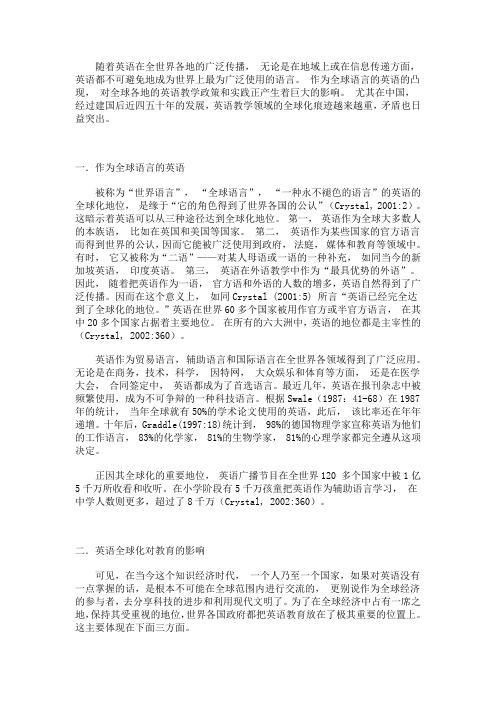
随着英语在全世界各地的广泛传播,无论是在地域上或在信息传递方面,英语都不可避免地成为世界上最为广泛使用的语言。
作为全球语言的英语的凸现,对全球各地的英语教学政策和实践正产生着巨大的影响。
尤其在中国,经过建国后近四五十年的发展,英语教学领域的全球化痕迹越来越重,矛盾也日益突出。
一.作为全球语言的英语被称为“世界语言”,“全球语言”,“一种永不褪色的语言”的英语的全球化地位,是缘于“它的角色得到了世界各国的公认”(Crystal, 2001:2)。
这暗示着英语可以从三种途径达到全球化地位。
第一,英语作为全球大多数人的本族语,比如在英国和美国等国家。
第二,英语作为某些国家的官方语言而得到世界的公认,因而它能被广泛使用到政府,法庭,媒体和教育等领域中。
有时,它又被称为“二语”——对某人母语或一语的一种补充,如同当今的新加坡英语,印度英语。
第三,英语在外语教学中作为“最具优势的外语”。
因此,随着把英语作为一语,官方语和外语的人数的增多,英语自然得到了广泛传播。
因而在这个意义上,如同Crystal (2001:5) 所言“英语已经完全达到了全球化的地位。
”英语在世界60多个国家被用作官方或半官方语言,在其中20多个国家占据着主要地位。
在所有的六大洲中,英语的地位都是主宰性的(Crystal, 2002:360)。
英语作为贸易语言,辅助语言和国际语言在全世界各领域得到了广泛应用。
无论是在商务,技术,科学,因特网,大众娱乐和体育等方面,还是在医学大会,合同签定中,英语都成为了首选语言。
最近几年,英语在报刊杂志中被频繁使用,成为不可争辩的一种科技语言。
根据Swale(1987:41-68)在1987年的统计,当年全球就有50%的学术论文使用的英语,此后,该比率还在年年递增。
十年后,Graddle(1997:18)统计到, 98%的德国物理学家宣称英语为他们的工作语言, 83%的化学家, 81%的生物学家, 81%的心理学家都完全遵从这项决定。
Globalization-英语版全球化PPT教学提纲

Aspects of Globalization
Economy
culture
Hale Waihona Puke PoliticsWith the develo pment of scienc e and technolog y, the economic globalization ha d been born an d now it is devel oping in a rapis
Tourism globalization 5 The solution to the problom
1
What is globalization?
Globalization is a process of interaction
and integration among the people, companies,
process
At last ,all of them will be fused together.The contact will be more and more closed.
fusion
He Shuang
clash
Then the clash start.Many things are changed and changing each other.
peed.
He Shuang
Cultural globalizatio n is the process whe
re by information, c
ommodities and im ages produced in o ne part of the world enter into a global f low that 'flattens ou t' cultural difference
英语全球化英语作文
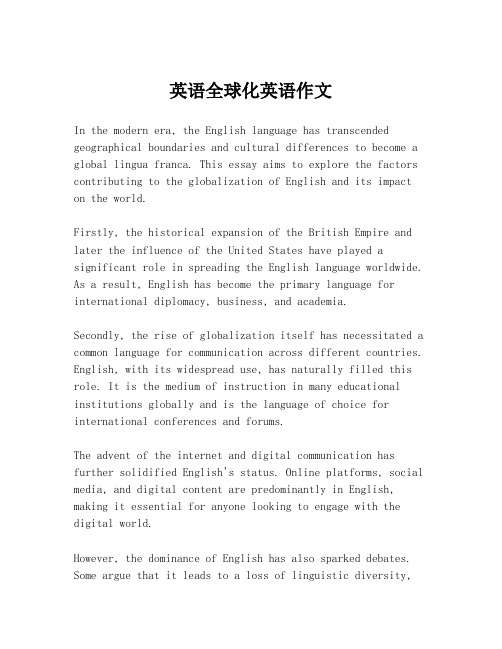
英语全球化英语作文In the modern era, the English language has transcended geographical boundaries and cultural differences to become a global lingua franca. This essay aims to explore the factors contributing to the globalization of English and its impact on the world.Firstly, the historical expansion of the British Empire and later the influence of the United States have played a significant role in spreading the English language worldwide. As a result, English has become the primary language for international diplomacy, business, and academia.Secondly, the rise of globalization itself has necessitated a common language for communication across different countries. English, with its widespread use, has naturally filled this role. It is the medium of instruction in many educational institutions globally and is the language of choice for international conferences and forums.The advent of the internet and digital communication has further solidified English's status. Online platforms, social media, and digital content are predominantly in English, making it essential for anyone looking to engage with the digital world.However, the dominance of English has also sparked debates. Some argue that it leads to a loss of linguistic diversity,as other languages may be overshadowed or even disappear. Others contend that it promotes cultural homogenization, where local cultures are overshadowed by the pervasive influence of English-speaking media.Despite these concerns, the globalization of English has undeniable benefits. It facilitates international trade, fosters global understanding, and provides access to a wealth of information and resources. Moreover, it empowers individuals with the ability to communicate across cultures, which is a valuable skill in our interconnected world.In conclusion, the globalization of the English language is a complex phenomenon with far-reaching implications. While it presents challenges, it also offers opportunities for global cooperation and exchange. As we continue to navigate our globalized society, it is crucial to embrace the benefits of a common language while also celebrating and preserving linguistic and cultural diversity.。
全球化

段。第一阶段自19世纪后半期到20世纪初,国际贸易的迅速发展和资本
、劳动力的大规模的国际性流动成为这个时期的重要特征;第二阶段是经过“一战”、“二战”之后,于50、60年代得到进一步发展,这个阶段以国际金融和国际贸易体制的形成以及跨国公司的大量出现为特征;第三阶段滥觞于70年代,到80、90年代形成一股强劲的浪潮,它是在新的科技革命、特别是信息革命的背景下,以技术创新和制度创新及扩散、资本在全球范围大规模流动和企业经营活动的国际化等为重要特征,这股浪潮方兴未艾,其影响空前广泛而深刻。
例如,波音747飞机共有45万个零部件,是由六个国家的100家大企业和15000家小企业联合生产的,其中包括了中国西安生产的飞机尾翼,现在跨国公司成为经济全球化的主体力量,据统计世界上4.4万个跨国公司的母公司,拥有28万个遍布世界的子公司和附属企业,形成一个庞大的全球生产和销售体系。由此可见,全球化是一场以发达国家为主的全球范围内的产业结构的调整。
当今世界的全球化主要表现在经济的全球化,包括金融,资本,生产和贸易的全球化。这已经成为当今全球化的主流,马克思,恩格斯曾经指出世界历史时代,是以开拓世界市场为基本形式的,大工业:“把世界各国人们相互联系起来,把所有地方性的小市场联合成为一个世界市场,到处为文明和进步做好了准备,使各文明国家里发生的一切必然影响到其余各国”。单是大工业建立了世界市场这一点,就把全球各国人民,尤其是各文明国家的人民,彼此紧紧联系起来,以致每个国家的人民都受到另一个国家发生的事情的影响,正是凭借着市场这只看不见的手,资本主义才在全球范围内建立起来广泛的经济联系,把一切民族和国家都卷入了世界经济体系。今天的经济全球化比马克思,恩格斯时代更具典型性。正如马克思,恩格斯在《共产党宣言》中指出;资本是天生的国际派,激烈而残酷的市场竞争,驱使资本占有者奔走于世界各地,他们到处落户,到处开发,到处建立联系。“
英语的全球化及其影响-教育文档
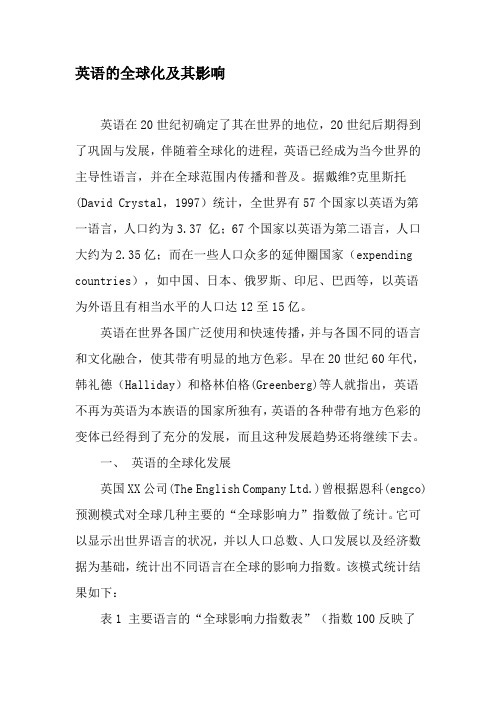
英语的全球化及其影响英语在20世纪初确定了其在世界的地位,20世纪后期得到了巩固与发展,伴随着全球化的进程,英语已经成为当今世界的主导性语言,并在全球范围内传播和普及。
据戴维?克里斯托(David Crystal,1997)统计,全世界有57个国家以英语为第一语言,人口约为3.37 亿;67个国家以英语为第二语言,人口大约为2.35亿;而在一些人口众多的延伸圈国家(expending countries),如中国、日本、俄罗斯、印尼、巴西等,以英语为外语且有相当水平的人口达12至15亿。
英语在世界各国广泛使用和快速传播,并与各国不同的语言和文化融合,使其带有明显的地方色彩。
早在20世纪60年代,韩礼德(Halliday)和格林伯格(Greenberg)等人就指出,英语不再为英语为本族语的国家所独有,英语的各种带有地方色彩的变体已经得到了充分的发展,而且这种发展趋势还将继续下去。
一、英语的全球化发展英国XX公司(The English Company Ltd.)曾根据恩科(engco)预测模式对全球几种主要的“全球影响力”指数做了统计。
它可以显示出世界语言的状况,并以人口总数、人口发展以及经济数据为基础,统计出不同语言在全球的影响力指数。
该模式统计结果如下:表1 主要语言的“全球影响力指数表”(指数100反映了英语在1995年的状况)由此模式可以看出,英语作为全球性语言具有无可替代的位置。
英语已成为通用的语言使得无论在上海工作的韩国主管,在布鲁塞尔制定法律的欧盟的德国籍官员,还是在瑞典开会的巴西生物学家都可能讲英语。
英语在全世界各个领域被广泛应用,包括政治、经济、贸易、文化、外交、旅游、通讯、自然科学和人文科学的学术研究等。
据统计,目前世界上有60多个国家把英语作为官方语言,85%的国际组织把英语列为通用语言(联合国、欧盟等),75%的邮件是用英语写的,80%的出版物和互联网信息是用英语出版和发布的,100%的软件源代码是英语格式。
英语作文全球化

英语作文全球化Globalization: A Double-Edged Sword。
Globalization, a term that has become ubiquitous in the modern world, is a multifaceted phenomenon that has transformed the way we live, work, and interact. It is a process that has interconnected the world, breaking down barriers and creating a global village where information, goods, and people flow more freely than ever before. However, the impact of globalization is a complex and often contentious issue, with both positive and negative implications.On the positive side, globalization has brought about numerous benefits. It has facilitated the exchange of ideas, cultures, and technologies, leading to a more diverse and enriched global community. The free flow of goods and services has created new economic opportunities, allowing countries to specialize in their areas of comparative advantage and engage in mutually beneficial trade. This hasled to increased prosperity, higher living standards, and a reduction in global poverty in many parts of the world.Furthermore, globalization has enabled the rapid dissemination of information and knowledge, empowering individuals and communities with access to a wealth of resources and information. This has fostered greater understanding and collaboration among people from different backgrounds, and has facilitated the spread of important advancements in fields such as science, medicine, and technology.However, the dark side of globalization cannot be ignored. One of the most significant challenges is the widening of economic disparities both within and between countries. As multinational corporations seek to maximize profits, they often relocate manufacturing and production to regions with lower labor costs, leading to job losses and economic displacement in developed countries. This has contributed to the erosion of the middle class and the rise of income inequality, fueling social unrest and political polarization.Moreover, the rapid integration of global markets has also increased the vulnerability of national economies to external shocks and financial crises. The 2008 global financial crisis, which originated in the United States, quickly spread to other parts of the world, highlightingthe interconnectedness of the global economy and the needfor robust regulatory frameworks to mitigate systemic risks.Another concern is the impact of globalization on the environment. The increased production and transportation of goods, as well as the growing consumption patterns drivenby globalization, have led to a significant increase in greenhouse gas emissions and environmental degradation. Climate change, deforestation, and the depletion of natural resources are all exacerbated by the global economic system, posing a grave threat to the long-term sustainability ofour planet.Furthermore, the rapid flow of people and ideas across borders has also led to cultural homogenization and the erosion of local traditions and identities. While culturalexchange can be enriching, the dominance of Western, particularly American, cultural products and values has raised concerns about the preservation of culturaldiversity and the autonomy of local communities.In addition, globalization has also facilitated the spread of transnational criminal activities, such as human trafficking, drug smuggling, and terrorism. The ease of movement and communication across borders has enabled these illicit networks to operate more effectively, posing significant challenges to national security and the rule of law.In conclusion, globalization is a complex and multifaceted phenomenon that has had a profound impact on the world. While it has brought about numerous benefits, such as economic growth, technological advancements, and cultural exchange, it has also exacerbated existing inequalities, environmental degradation, and security challenges. As we navigate the 21st century, it is crucial that we address the negative consequences of globalization while harnessing its positive potential. This will requirea collaborative and coordinated effort among nations, international organizations, civil society, and individuals to ensure that the benefits of globalization are more equitably distributed and its risks are effectively mitigated.。
Globalization 英语版全球化PPT
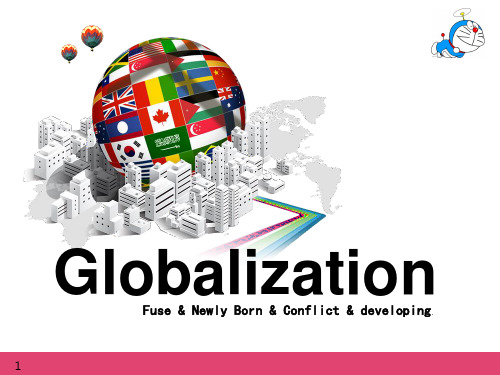
differTeEnXtT nations. TEXT
TEXT
multinationalization
multinationnalization is the first part of the process of globalization. It's a foundation.
internationalization
peed.
He Shuang
Cultural globalizatio n is the process whe
re by information, c
ommodities and im ages produced in o ne part of the world enter into a global f low that 'flattens ou t' cultural difference
Citizens have started from the beginning of the domestic tourism and play, began to move towards the province, abroad began to change.
Truly into the field of international tourism
take concerted action .
Nowadays,internati nal tourism is the biggest industry in the world.Unfortunately ,international tourism creates tensio rather than undersanding between people from different cultures.
全球化-英语演讲
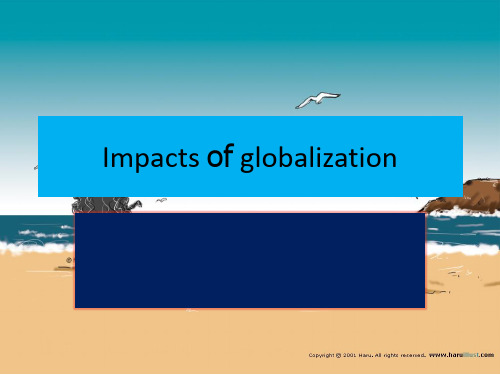
Food and lifestyle
Supermarket
麦德龙--德国
欧尚--法国
太平洋百货--台北
沃尔韩国
Phones
Popular Culture
• Globalization promotes cross-culture contact and people‘s participation in a “world culture”.On the whole, with the globalization today, all kinds of culture come together, it’s no wonder come out the culture collision. What we should do is not all excluding and all excepting when we except the foreign things.
Impacts of globalization
What is globalization?
Globalization is the
process of
international
integration arising
from the
interchange of world
views, products, ideas, and other aspects of culture.
We need to think about these questions carefully.
- 1、下载文档前请自行甄别文档内容的完整性,平台不提供额外的编辑、内容补充、找答案等附加服务。
- 2、"仅部分预览"的文档,不可在线预览部分如存在完整性等问题,可反馈申请退款(可完整预览的文档不适用该条件!)。
- 3、如文档侵犯您的权益,请联系客服反馈,我们会尽快为您处理(人工客服工作时间:9:00-18:30)。
英语全球化的利弊With the process of globalization, English becomes more and more popular. Faced with the question whether the spread of English all over the world is advantageous or not, there is no consensus of opinion among people. As to me, I will say it is disadvantageous without any hesitation. A number of factors could account for this phenomenon. First and foremost, English can divide the society into many classes, which widen the gap between the rich and the poor. We can take China as an example, recently, English becomes more and more popular, and lots of companies regard English as a boundary in interviews. In China, if there are two people who own same education seeking for the same job, under this circumstance, the one who masters English better will get more chance and this situation also adapt for many other countries. Secondly, English is endangering linguistic diversity and causing culture disaster. The linguists says that there are almost seventy thousand kinds of languages in the world, and half of them on the brink of extinction, what’s worse, every two weeks there is one language disappearing, which is two times as many as mammals, and four times as many as birds. There is no doubt that English accelerates this course. Besides, language is the carrier of culture, that is to say, the variety of culture is also in a dangerous state with the extinction of languages. To some degree, we can also gain information from many countries’ behavior. In 2000, Poland’s government makes alaw for banning English used in their advertisements; in recent years, France also asks their people use French in formal occasions, except there isn’t a world to express the meaning, or it will be illegal. These examples can testify that English had led to linguistic and culture invasion. Last but not least. The widespread of English is also bad for itself. On the one hand, people from English countries are unwilling to learn other languages or get to know another culture, and some researches indicate that it’s more difficult for them to learn a second language than other countries, all of these can account for the popularity of English. On the other hand, English is also changed during the disseminative progress. It had already shaped the “new English”, such as Indian English, Chinglish and so on. All in all, the extinction of language, the fading of culture, and the invasion of other cultures and the changing of native English, which are all signals that the spread of English all over the world is disadvantageous.英语与全球贸易全球化与国际贸易由于全球化的原因,国际间的贸易不断增强。
而一些不同国家的传统习惯,也慢慢进入到了贸易里。
而一些大家公认的经济的常识也慢慢地被人们所用。
例如全球化(globalization)一词,是一种概念,也是一种人类社会发展的现象过程。
全球化目前有诸多定义,通常意义上的全球化是指全球联系不断增强,人类生活在全球规模的基础上发展及全球意识的崛起。
国与国之间在政治、经济贸易上互相依存。
全球化亦可以解释为世界的压缩和视全球为一个整体The term globalization, is a concept, but also a process of the development of human society phenomenon. Globalization has many definitions. In the usual sense of globalization refers to the growing global links. The rise of the development of human life based on a global scale and the global consciousness will improve. Between country andcountry in the political, economic and trade interdependence, globalization also can be explained by the compression and the earth as a whole world.国际贸易(International Trade)是指不同国家(和/或地区)之间的商品和劳务的交换活动。
国际贸易是商品和劳务的国际转移。
国际贸易也叫世界贸易。
国际贸易由进口贸易(Import Trade)和出口贸易(Export Trade)两部分组成,故有时也称为进出口贸易。
International trade is the exchange activities between different countries of goods and services. International trade is the international transfer of goods and services. International trade also called world trade. International trade is composed of two parts the import and export trade It is sometimes called as the import and export trade.语言全球化与政治对南北关系产生双重影响南北关系的实质是发展中国家摆脱发达国家经济和政治上的剥削与控制,谋求建立公正合理的国际政治、经济新秩序。
经济全球化对南北关系产生了双重的影响。
从积极的方面来看,首先南北关系长期以来的紧张态势得到一定程度的缓解。
过去南方对北方的单向依赖已变成双方的相互依赖和相互竞争,南北经济交往的规模和密切程度空前增强。
彼此都认识到,只有保持南北双方和谐发展,世界经济才能得以健康地运行。
双方都在处理南北关系时表现出务实性和灵活性,放弃了一些过高的、不切实际的要求。
其次,一些发展中国家抓住新的发展机遇,缩短了与发达国家的经济差距,南方的国际地位有所提高。
南方国家之间要求加强经济和科技合作的呼声很高Have a double impact on North South RelationsThe essence of North South relations are developing countries get rid of exploitation and control of developed countries economically and politically, and sought to establish a new international political and economic order, fair and reasonable. Economic globalization has double effects on North South relations. On the positive side, the North South relations tension has eased to some extent. The past one-way dependence on the North South has become dependent on both sides and mutual competition, scale and extent of South North economic exchanges and enhanced. To know each other, only to maintain the harmonious development of the world economy in both north and south, to the healthy operation of. Both sides in the treatment of North South relations showed pragmatism and flexibility, to give up some excessive, unrealistic demands. Secondly, some developing countries to seize the new opportunities of development, shorten the economic gap with the developed countries, the South's international status has improved. Southern countries called for strengthening the economic and technological cooperation is very high voice.推动区域内国家联合经济全球化带来世界市场的激烈竞争,各个国家,特别是弱国、小国,都希望增强自身的竞争力,但是一个国家又往往力不从心,于是有着地理、文化等若干共同因素的国家就通过区域内国家的联合,通过地区经济一体化来加强争夺市场份额的能力。
